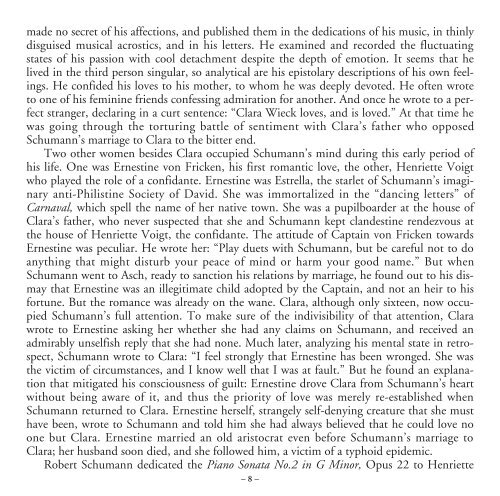Ruth Slenczynskaâ¢SCHUMANN Ruth Slenczynska ... - Ivory Classics
Ruth Slenczynskaâ¢SCHUMANN Ruth Slenczynska ... - Ivory Classics
Ruth Slenczynskaâ¢SCHUMANN Ruth Slenczynska ... - Ivory Classics
You also want an ePaper? Increase the reach of your titles
YUMPU automatically turns print PDFs into web optimized ePapers that Google loves.
made no secret of his affections, and published them in the dedications of his music, in thinly<br />
disguised musical acrostics, and in his letters. He examined and recorded the fluctuating<br />
states of his passion with cool detachment despite the depth of emotion. It seems that he<br />
lived in the third person singular, so analytical are his epistolary descriptions of his own feelings.<br />
He confided his loves to his mother, to whom he was deeply devoted. He often wrote<br />
to one of his feminine friends confessing admiration for another. And once he wrote to a perfect<br />
stranger, declaring in a curt sentence: “Clara Wieck loves, and is loved.” At that time he<br />
was going through the torturing battle of sentiment with Clara’s father who opposed<br />
Schumann’s marriage to Clara to the bitter end.<br />
Two other women besides Clara occupied Schumann’s mind during this early period of<br />
his life. One was Ernestine von Fricken, his first romantic love, the other, Henriette Voigt<br />
who played the role of a confidante. Ernestine was Estrella, the starlet of Schumann’s imaginary<br />
anti-Philistine Society of David. She was immortalized in the “dancing letters” of<br />
Carnaval, which spell the name of her native town. She was a pupilboarder at the house of<br />
Clara’s father, who never suspected that she and Schumann kept clandestine rendezvous at<br />
the house of Henriette Voigt, the confidante. The attitude of Captain von Fricken towards<br />
Ernestine was peculiar. He wrote her: “Play duets with Schumann, but be careful not to do<br />
anything that might disturb your peace of mind or harm your good name.” But when<br />
Schumann went to Asch, ready to sanction his relations by marriage, he found out to his dismay<br />
that Ernestine was an illegitimate child adopted by the Captain, and not an heir to his<br />
fortune. But the romance was already on the wane. Clara, although only sixteen, now occupied<br />
Schumann’s full attention. To make sure of the indivisibility of that attention, Clara<br />
wrote to Ernestine asking her whether she had any claims on Schumann, and received an<br />
admirably unselfish reply that she had none. Much later, analyzing his mental state in retrospect,<br />
Schumann wrote to Clara: “I feel strongly that Ernestine has been wronged. She was<br />
the victim of circumstances, and I know well that I was at fault.” But he found an explanation<br />
that mitigated his consciousness of guilt: Ernestine drove Clara from Schumann’s heart<br />
without being aware of it, and thus the priority of love was merely re-established when<br />
Schumann returned to Clara. Ernestine herself, strangely self-denying creature that she must<br />
have been, wrote to Schumann and told him she had always believed that he could love no<br />
one but Clara. Ernestine married an old aristocrat even before Schumann’s marriage to<br />
Clara; her husband soon died, and she followed him, a victim of a typhoid epidemic.<br />
Robert Schumann dedicated the Piano Sonata No.2 in G Minor, Opus 22 to Henriette<br />
– 8 –














